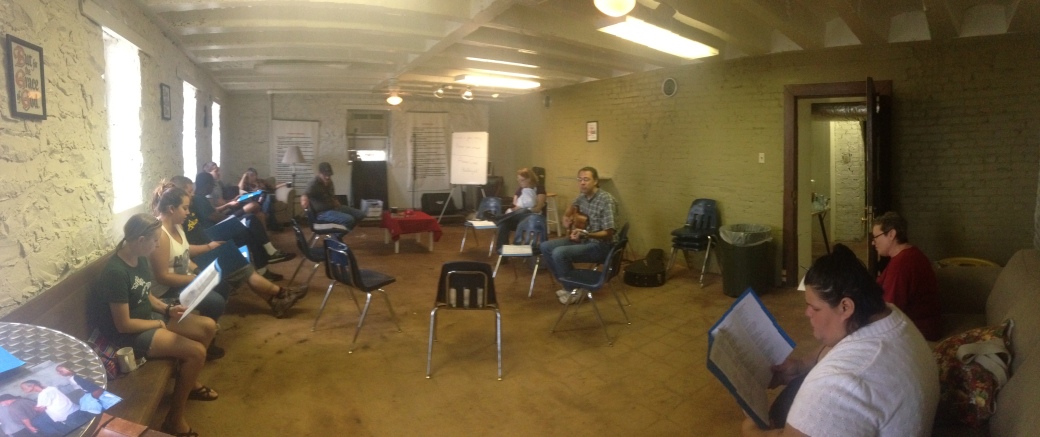One of my primary responsibilities as a YAV is to cultivate the garden at Ferncliff Camp and Conference Center. A few weeks ago (or months now? It’s a been a while since my last update), I was charged with constructing a keyhole garden. Here’s the basic principle: it’s a circular raised bed that looks like a piece of pie was cut out. In the center of the bed is a compost basket. When you water the compost, the nutrients seep into the surrounding bed. Keyhole gardens are often found in impoverished countries with poor soil and little rainfall. You don’t need to water the plants growing around the perimeter; only the compost basket in the center of the circle needs water for the surrounding garden to flourish.

Perhaps my favorite part about working in a garden is discovering the many metaphors that resonate with my life. I’ve found that gardening reveals simple truths about myself, about God, and about what the kingdom of God looks like in its purest, unadulterated form. So the whole time I was building the keyhole garden, I wondered about how this garden reflects the kingdom of God. My mind kept returning to how radical it is to put compost in the center of the garden. Compost, made up of the stuff we throw away, the uneaten food, the trash, what we’ve cast out, is in the center. What you keep hidden in a trash can, maybe under your sink or in a far corner of the house, take out every few days so its smell doesn’t permeate your home…that’s what’s necessary to sustain life. What we often cast aside as trash is exactly what you need to cultivate in order for the rest of the garden to thrive. This disrupts how I think about the sacred and the profane. Trash is made sacred by sustaining life. The value we normally ascribe to trash is turned upside down in this new context.
Extending this even further, what does this imply about groups of people systemically treated as trash? Who does society marginalize, cast out, and throw away? In the last few years, I’ve had many opportunities to work closely with people experiencing homelessness. Life on the streets is isolating and dehumanizing, and even many of the services provided for people experiencing homelessness rely on a hierarchical model: server and served, us and them. Even agencies with the best of intentions use dehumanizing language and frameworks that further marginalize people experiencing homelessness.
At the Little Rock YAV site, we spend about 4-5 hours a week outside of Ferncliff working with a community organization of our choice. After touring nearly ten organizations, I chose to work with Mercy Community Church, an ecumenical worship community for people with and without housing. It’s a space of hospitality, rooted in the notion that worship can function as a space that breaks down social and class barriers between people. Mercy Church doesn’t provide any social services; it’s simply a space for people to be in relationship with each other. I often can’t tell who has a home and who doesn’t. We sing together, passing around a bag of instruments where anyone can play anything regardless of skill level (there’s quite a bit of off-tempo drumming, which I absolutely contribute to). After we sing, we lift up joys and concerns; because we’re a community, we shout hallelujah together for the praises and ask God to hear our prayers collectively. After a break for some coffee and fellowship, we study a Bible passage together in place of a sermon. Power is intentionally decentralized; Mercy Church’s theological principles inform and guide every aspect of our worship together:
“God has a particular heart for the poor, calling the Church to create spaces of hospitality for those who do not find a place of welcome elsewhere. Because we believe that God is already—and especially—active at the margins, we believe we are called to be among the poor not primarily as teachers and providers but as co-learners and friends, to be transformed as much as to transform, to recognize our own need for recovery as much as to help others recover, and to find the Gospel in the margins rather than proclaiming it from our positions of privilege. As a result, our vision is not to create a ministry to the homeless but rather to develop a welcoming and accepting ministry with and among the homeless as partners and neighbors—as brothers and sisters in Christ.”

Mercy Church, like the keyhole garden, reflects the inside-out upside-down values of this kingdom Jesus talks about throughout the Gospels. Where those relegated to the margins are brought into the center. Where nurturing and caring for what is unjustly deemed “trash” nourishes and sustains life. Where the first will be last, where a King is the least of these, the poor, the sick, the imprisoned, the homeless, the hungry, and the brokenhearted. Jesus tells us in Luke: “The kingdom of God is already in your midst.” It’s among, around, and within us, but it’s not yet fully realized. This is why when Jesus talks about what the kingdom of God is like or when we experience kingdom moments in the ordinariness of our lives, we need to pay attention. The beauty of following Jesus is that we’re called to be co-builders, to plant seeds that will one day grow, to water the seeds already planted, to be a step along the way to bringing Jesus’ kingdom into the world. The kingdom is not a location; it is a state of being, a way to live, a commitment to loving God, loving others, and loving yourself. It’s a promise and an opportunity to love fiercely in the face of fear and to be “prophets of a future not our own.”
I’m so grateful to be YAVing here in Little Rock and to have the opportunity to bear witness to many kingdom moments whether in the garden or worshiping with friends experiencing homelessness.